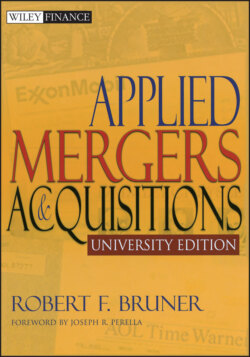Читать книгу Applied Mergers and Acquisitions - Robert F. Bruner - Страница 27
Higher Standard
ОглавлениеEthics sets a higher standard than laws and regulations. Several chapters in this book highlight the boundaries on managerial action set by laws and regulations. But to a large extent, the law is a crude instrument: It tends to trail rather than anticipate behavior; it contains gaps that become recreational exploitation for the aggressive businessperson; justice may be neither swift nor proportional to the crime; and as Andrew Wicks said, it “puts you in an adversarial posture with respect to others, which may be counterproductive to other objectives in facing a crisis.”5 To use only the law as a basis for ethical thinking is to settle for the lowest common denominator of social norms. As former chairman of the Securities and Exchange Commission (SEC) Richard Breeden said, “It is not an adequate ethical standard to want to get through the day without being indicted.”6
Some might object to this line of thinking by claiming that in a pluralistic society, the law is the only baseline of norms on which society can agree. Therefore, isn’t the law a “good enough” guide to ethical behavior? Lynn Sharpe Paine (1999) argues that this leads to a “compliance” mentality and that ethics takes one farther. She writes, “Attention to law, as an important source of managers’ rights and responsibilities, is integral to, but not a substitute for, the ethical point of view—a point of view that is attentive to rights, responsibilities, relationships, opportunities to improve and enhance human well-being, and virtue and moral excellence.”7
